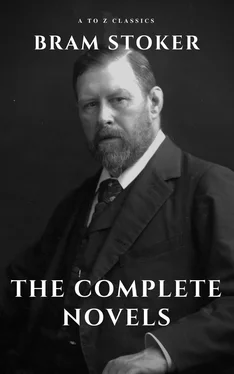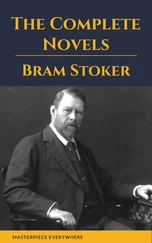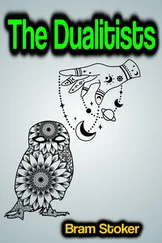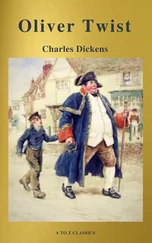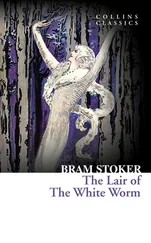A to Z Classics - Bram Stoker - The Complete Novels
Здесь есть возможность читать онлайн «A to Z Classics - Bram Stoker - The Complete Novels» — ознакомительный отрывок электронной книги совершенно бесплатно, а после прочтения отрывка купить полную версию. В некоторых случаях можно слушать аудио, скачать через торрент в формате fb2 и присутствует краткое содержание. Жанр: unrecognised, на английском языке. Описание произведения, (предисловие) а так же отзывы посетителей доступны на портале библиотеки ЛибКат.
- Название:Bram Stoker: The Complete Novels
- Автор:
- Жанр:
- Год:неизвестен
- ISBN:нет данных
- Рейтинг книги:4 / 5. Голосов: 1
-
Избранное:Добавить в избранное
- Отзывы:
-
Ваша оценка:
- 80
- 1
- 2
- 3
- 4
- 5
Bram Stoker: The Complete Novels: краткое содержание, описание и аннотация
Предлагаем к чтению аннотацию, описание, краткое содержание или предисловие (зависит от того, что написал сам автор книги «Bram Stoker: The Complete Novels»). Если вы не нашли необходимую информацию о книге — напишите в комментариях, мы постараемся отыскать её.
The Complete Novels :
The Primrose Path
The Snake's Pass
The Watter's Mou'
The Shoulder of Shasta
Dracula
Miss Betty
The Mystery of the Sea
The Jewel of Seven Stars
The Man
Lady Athlyne
The Lady of the Shroud
The Lair of the White Worm
Bram Stoker: The Complete Novels — читать онлайн ознакомительный отрывок
Ниже представлен текст книги, разбитый по страницам. Система сохранения места последней прочитанной страницы, позволяет с удобством читать онлайн бесплатно книгу «Bram Stoker: The Complete Novels», без необходимости каждый раз заново искать на чём Вы остановились. Поставьте закладку, и сможете в любой момент перейти на страницу, на которой закончили чтение.
Интервал:
Закладка:
Another pause, and then Maggie spoke again. Willy could not see her face, but she seemed to speak between gasps for breath.
“Ye’re lookin’ for hard wark the nicht?”
“I am! — I fear so.”
“I can guess that that telegram tellt ye that some boats would try to rin in somewhere the nicht.”
“Mayhap, lass. But the telegrams are secret, and I must not speak of what’s in them.”
After a long pause Maggie spoke again, but in a voice so low that he could hardly hear her amid the roar of the breaking waves which came in on the wind:
“Willy, ye’re not a cruel man! — ye wadna, if ye could help it, dae harm to them that loved ye, or work woe to their belongin’s?”
“My lass! that I wouldn’t.”
As he answered he felt a horrible sinking of the heart. What did all this mean? Was it possible that Maggie, too, had any interest in the smuggling? No, no! a thousand times no! Ashamed of his suspicion he drew closer and again put his arm around her in a protecting way. The unexpected tenderness overcame her, and, bursting into tears, she threw herself on Willy’s neck and whispered to him between her sobs:
“O Willy, Willy! I’m in sic sair trouble, and there’s nane that I can speak to. Nae! not ane in the wide warld.”
“Tell me, darling; you know you’ll soon be my wife, and then I’ll have a right to know all!”
“Oh, I canna! I canna! I canna!” she said, and taking her arms from round his neck she beat her hands wildly together. Willy was something frightened, for a woman’s distress touches a strong man in direct ration to his manliness. He tried to soothe her as though she were a frightened child, and held her tight to him.
“There! there! my darling. Don’t cry. I’m here with you, and you can tell me all your trouble.”
She shook her head; he felt the movement on his breast, and he went on:
“Don’t be frightened, Maggie; tell me all. Tell me quietly, and mayhap I can help ye out over the difficult places.”
Then he remained silent, and her sobs grew less violent; at last she raised her head and dashed away her tears fiercely with her hand. She dragged herself away from him: he tried to stop her, but she said:
“Nae, nae, Willy dear; let me speak it in my am way. If I canna trust ye, wha can I trust? My trouble is not for mysel.”
She paused, and he asked:
“Who, then, is it for?”
“My father and my brothers.” Then she went on hurriedly, fearing to stop lest her courage should fail her, and he listened in dead silence, with a growing pain in his heart.
“Ye ken that for several seasons back our boat has had bad luck — we took less fish and lost mair nets than any of the boats; even on the land everything went wrong. Our coo died, and the shed was blawn doon, and then the blight touched the potatoes in our field. Father could dae naething, and had to borrow money on the boat to go on with his wark; and the debt grew and grew, till now he only owns her in name, and we never ken when we may be sold up. And the man that has the mortgage isn’t like to let us off or gie time!”
“Who is he? His name?” said Willie hoarsely.
“Mendoza — the man frae Hamburg wha lends to the boats at Peterhead.”
Willy groaned. Before his eyes rose the vision of that hard, cruel, white face that he had seen only a few minutes ago, and again he saw him hand out the presents with which he had bought the man and woman to help in his wicked scheme. When Maggie heard the groan her courage and her hope arose. If her lover could take the matter so much to heart all might yet be well, and in the moment all the womanhood in her awoke to the call. Her fear had broken down the barriers that had kept back her passion, and now the passion came with all the force of a virgin nature. She drew Willy close to her — closer still — and whispered to him in a low sweet voice, that thrilled with emotion:
“Willy, Willy, darlin’; ye wouldna see harm come to my father — my father, my father!” and in a wave of tumultuous, voluptuous passion she kissed him full in the mouth. Willy felt for the moment half dazed. Love has its opiates that soothe and stun even in the midst of their activity. He clasped Maggie close in his arms, and for a moment their hearts beat together and their mouths breathed the same air. Then Willy drew back, but Maggie hung limp in his arms. The silence which hung in the midst of nature’s tumult broke its own spell. Willy realised what and where he was: with the waves dashing below his feet and the night wind laden with drifting mist wreathing around him in the darkness, and whistling amongst the rocks and screaming sadly through the ropes and stays of the flagstaff on the cliff. There was a wild fear in his heart and a burning desire to know all that was in his sweetheart’s mind.
“Go on, Maggie! go on!” he said.
Maggie roused herself and again took up the thread of her story — this time in feverish haste. The moment of passion had disquieted and disturbed her. She seemed to herself to be two people, one of whom was new to her, and whom she feared, but woman-like, she felt that as she had begun so must she go on; and thus her woman’s courage sustained her.
“Some weeks ago, father began to get letters frae Mr. Mendoza, and they aye upset him. He wrote answers and sent them away at once. Then Mr. Mendoza sent him a telegram frae Hamburg, and he sent a reply — and a month ago father got a telegram telling him to meet him at Peterhead. He was very angry at first and very low-spirited after; but he went to Peterhead, and when he cam back he was very still and quite pale. He would eat naething, and went to bed although it was only seven o’clock. Then there were more letters and telegrams, but father answered nane o’ them — sae far as I ken — and then Mr. Mendoza cam to our hoose. Father got as pale as a sheet when he saw him, and then he got red and angry, and I thocht he was going to strike him; but Mr. Mendoza said not to frichten his daughter, and father got quiet and sent me oot on a message to the Nether Mill. And when I cam back Mr. Mendoza had gone, and father was sitting with his face in his hands, and he didna hear me come in. When I spoke, he started up and he was as white as a sheet, and then he mumbled something and went into his room. And ever since then he hardly spoke to any one, and seemed to avoid me a’thegither. When he went away the last time he never even kissed me. And so, Willy — so, I fear that that awfu’ Mr. Mendoza has made him dae something that he didna want to dae, and it’s all breaking my heart!” and again she laid her head on her lover’s breast and sobbed.
Willy breathed more freely; but he could not be content to remain in doubt, and his courage was never harder tried than when he asked his next question.
“Then, Maggie, you don’t know anything for certain?”
“Naething, Willy — but I fear.”
“But there may be nothing, after all!” Maggie’s hopes rose again, for there was something in her lover’s voice which told her that he was willing to cling to any straw, and once again her woman’s nature took advantage of her sense of right and wrong. “Please God, Willy, there may be naething! but I fear much that it may be so; but we must act as if we didna fear. It wadna dae to suspect poor father without some cause. You know, Willy, the Earl has promised to mak him the new harbourmaster. Old Forgie is bedridden now, and when winter comes he’ll no even be able to pretend to work, so the Earl is to pension him, and father will get the post and hae the hoose by the harbour, and you know that every one’s sae glad, for they a’ respect father.”
“Ay, lass,” interrupted Willy, “that’s true; and why, then, should we — you and me, Maggie — think he would do ill to please that damned scoundrel, Mendoza?”
Читать дальшеИнтервал:
Закладка:
Похожие книги на «Bram Stoker: The Complete Novels»
Представляем Вашему вниманию похожие книги на «Bram Stoker: The Complete Novels» списком для выбора. Мы отобрали схожую по названию и смыслу литературу в надежде предоставить читателям больше вариантов отыскать новые, интересные, ещё непрочитанные произведения.
Обсуждение, отзывы о книге «Bram Stoker: The Complete Novels» и просто собственные мнения читателей. Оставьте ваши комментарии, напишите, что Вы думаете о произведении, его смысле или главных героях. Укажите что конкретно понравилось, а что нет, и почему Вы так считаете.
